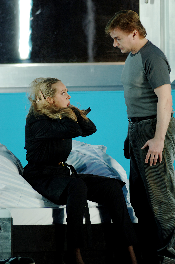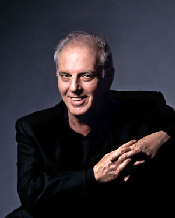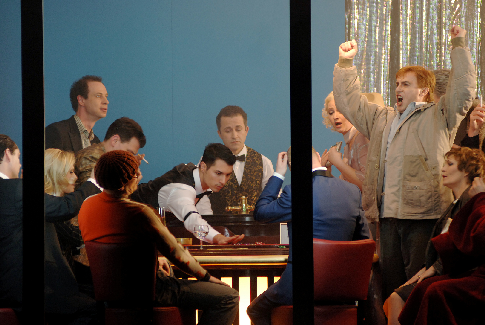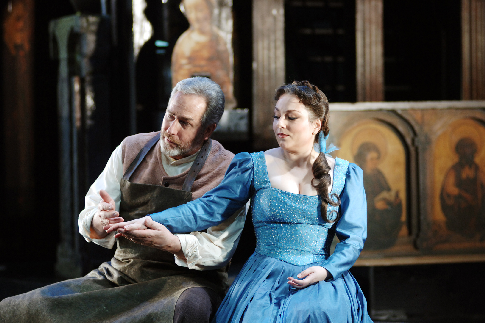
07 Apr 2008
Barenboim and Berlin — beauty and brilliance
BERLIN — Which car-rental agency was it that was once No. 2 and “trying harder?”
English Touring Opera are delighted to announce a season of lyric monodramas to tour nationally from October to December. The season features music for solo singer and piano by Argento, Britten, Tippett and Shostakovich with a bold and inventive approach to making opera during social distancing.
This tenth of ten Live from London concerts was in fact a recorded live performance from California. It was no less enjoyable for that, and it was also uplifting to learn that this wasn’t in fact the ‘last’ LfL event that we will be able to enjoy, courtesy of VOCES8 and their fellow vocal ensembles (more below …).
Ever since Wigmore Hall announced their superb series of autumn concerts, all streamed live and available free of charge, I’d been looking forward to this song recital by Ian Bostridge and Imogen Cooper.
Although Stile Antico’s programme article for their Live from London recital introduced their selection from the many treasures of the English Renaissance in the context of the theological debates and upheavals of the Tudor and Elizabethan years, their performance was more evocative of private chamber music than of public liturgy.
Evidently, face masks don’t stifle appreciative “Bravo!”s. And, reducing audience numbers doesn’t lower the volume of such acclamations. For, the audience at Wigmore Hall gave soprano Elizabeth Llewellyn and pianist Simon Lepper a greatly deserved warm reception and hearty response following this lunchtime recital of late-Romantic song.
For this week’s Live from London vocal recital we moved from the home of VOCES8, St Anne and St Agnes in the City of London, to Kings Place, where The Sixteen - who have been associate artists at the venue for some time - presented a programme of music and words bound together by the theme of ‘reflection’.
'Such is your divine Disposation that both you excellently understand, and royally entertaine the Exercise of Musicke.’
‘And there was war in heaven: Michael and his angels fought against the dragon; and the dragon fought and his angels, And prevailed not; neither was their place found any more in heaven … that old serpent … Satan, which deceiveth the whole world: he was cast out into the earth, and his angels were cast out with him.’
There was never any doubt that the fifth of the twelve Met Stars Live in Concert broadcasts was going to be a palpably intense and vivid event, as well as a musically stunning and theatrically enervating experience.
‘Love’ was the theme for this Live from London performance by Apollo5. Given the complexity and diversity of that human emotion, and Apollo5’s reputation for versatility and diverse repertoire, ranging from Renaissance choral music to jazz, from contemporary classical works to popular song, it was no surprise that their programme spanned 500 years and several musical styles.
The Academy of St Martin in the Fields have titled their autumn series of eight concerts - which are taking place at 5pm and 7.30pm on two Saturdays each month at their home venue in Trafalgar Square, and being filmed for streaming the following Thursday - ‘re:connect’.
The London Symphony Orchestra opened their Autumn 2020 season with a homage to Oliver Knussen, who died at the age of 66 in July 2018. The programme traced a national musical lineage through the twentieth century, from Britten to Knussen, on to Mark-Anthony Turnage, and entwining the LSO and Rattle too.
With the Live from London digital vocal festival entering the second half of the series, the festival’s host, VOCES8, returned to their home at St Annes and St Agnes in the City of London to present a sequence of ‘Choral Dances’ - vocal music inspired by dance, embracing diverse genres from the Renaissance madrigal to swing jazz.
Just a few unison string wriggles from the opening of Mozart’s overture to Le nozze di Figaro are enough to make any opera-lover perch on the edge of their seat, in excited anticipation of the drama in music to come, so there could be no other curtain-raiser for this Gala Concert at the Royal Opera House, the latest instalment from ‘their House’ to ‘our houses’.
"Before the ending of the day, creator of all things, we pray that, with your accustomed mercy, you may watch over us."
The doors at The Metropolitan Opera will not open to live audiences until 2021 at the earliest, and the likelihood of normal operatic life resuming in cities around the world looks but a distant dream at present. But, while we may not be invited from our homes into the opera house for some time yet, with its free daily screenings of past productions and its pay-per-view Met Stars Live in Concert series, the Met continues to bring opera into our homes.
Music-making at this year’s Grange Festival Opera may have fallen silent in June and July, but the country house and extensive grounds of The Grange provided an ideal setting for a weekend of twelve specially conceived ‘promenade’ performances encompassing music and dance.
There’s a “slide of harmony” and “all the bones leave your body at that moment and you collapse to the floor, it’s so extraordinary.”
“Music for a while, shall all your cares beguile.”
The hum of bees rising from myriad scented blooms; gentle strains of birdsong; the cheerful chatter of picnickers beside a still lake; decorous thwacks of leather on willow; song and music floating through the warm evening air.

BERLIN — Which car-rental agency was it that was once No. 2 and “trying harder?”
No one remembers, for today — if lines at airport counters are an indication — the two are neck and neck with both doing well. Their competition comes to mind, however, here in Berlin, where the Philharmonic, looking back on golden ages under Wilhelm Furtwängler and Herbert von Karajan, has long been the No. 1 orchestra not only here, but — in the eyes of many — in the whole world. In the long-divided city the Staatskapelle, on the other hand, attracted little attention in its primary role as the competent but colorless pit band in the historic Staatsoper on Unter den Linden in the East. Then — in 1989 — the Wall came down, and — in 1992 — Daniel Barenboim was made maestro of the opera and its orchestra.
 Daniel Barenboim
Daniel Barenboim
A week in the city over Easter underscored his success in bringing to both a brilliance that declares them no longer No. 2 to anyone. Easter is, of course, the time for Barenboim and his forces to shine, for the Philharmonic and its charismatic conductor Simon Rattle are off in Salzburg for the spring festival that Karajan founded there. Barenboim performances are the heart of the local “Festtage,” a mini-festival instituted even before the Wall was built to attract audiences to the East.
On March 16 Barenboim kicked off the series at the Staatsoper with the first Berlin staging of Prokofiev’s “The Gambler,” a torrid tale of love and the loss of fortunes based on Dostoyevsky’s 1866 novella that reflected the author’s own addiction to gambling. In an eye-catching updating by Dmitri Tcherniakov, responsible also for sets and costumes, gamblers were on stage in fictional Roulettenburg even before the music began. Prokofiev went to work on “Gambler” in 1915 when he was 24. A first version was slated for production in St. Petersburg, but cancelled when street fighting heralded the revolution. Plans for a Russian staging were later scrapped because the composer was living abroad. The opera — revised in 1927-‘28, was premiered in Brussels in 1929 and has had only a handful of stagings since then. (It played at the Chicago Lyric Opera in 1991.) This made the production at the Staatsoper, where Barenboim is cherished above all for his work with Mozart and Wagner, an event of special interest, and — with best seats selling at 260 Euros (around $400) — the historic house was packed.
 Scene from The Gambler
Scene from The Gambler
Conductor and orchestra had fully mastered Prokofiev’s chrome-plated score, which with its sharp edges and abrupt corners recalls that “Gambler” is the contemporary of Berg’s “Wozzeck.” The work’s study of a society sick to the depths of its soul is of obvious contemporary relevance. Largely through-composed, “Gambler” gives primacy to the text — sung here in Russian with titles in German, and for it Barenboim assembled a cast of two dozen that was without a weak link. Christine Opolais was stellar and sympathetic as Polina, a young newly rich woman unable to believe that a man could love her without selfish goals, and as that young man Misha Didyk was a dramatically overwhelming Alexej. Outstanding were two character roles: Stefania Toczyska as the matriarchal Babulenka who gambles away jewels and furs to stand figuratively naked before false gods, and bass Vladimir Ognovenko as the equally depraved General. “Gambler” tells a dark and threatening story. Barenboim and his ensemble told it with conviction.
 Scene from Die Meistersinger: James Morris (Hans Sachs) and Dorothea Röschmann (Eva)
Scene from Die Meistersinger: James Morris (Hans Sachs) and Dorothea Röschmann (Eva)
Barenboim was back on the podium on Palm Sunday to conduct Harry Kupfer’s stunningly colorful production of that most German of all operas, “Die Meistersinger,” and it was on this familiar Wagnerian turf that the he and the Staatsoper were of truly unsurpassable excellence. In his sensitive approach to the Overture Barenboim made voices audible that one had never heard before, and the pathos-ridden Prelude to Act Three, often tossed aside unthinkingly en route to the pageantry of the final scene, was gripping in its bitter sweetness.
In his house debut James Morris, the reigning Wotan of his generation, was touchingly convincing as Hans Sachs, Wagner’s shoemaker torn between his own love for Eva and his support for young Walter in his efforts to break the ossified rules of the master minstrels. Morris played an understated Sachs and was in even smoother and richer voice here than he was for his debut in the role at the San Francisco Opera in 2001 and in the DVD that originated at the Met the following season. Dorothea Röschmann, a Mozartian now moving into lighter Wagner roles, sang Eva with ease and clarity, while Burkhard Fritz was a Walter of often bashful youth. Among the masters Rene’ Pape stood out as an aristocratic Pogner, and Roman Trekel was a handsome — if pedantic — Beckmesser, who avoided clichés of self-parody. And while David and Magdalene are roles often assigned to singers on the eve of retirement, it was refreshing to hear them sung — and sung well — by youthful Florian Hoffmann and Katharina Kammerloher. Yet it was Barenboim who made these two evenings a triumph of perfection. Everything spoke of immense care and concern for the task at hand. And it was a nice touch that Barenboim brought the entire orchestra on stage for a curtain call at the end of “Meistersinger.”
To fully appreciate the excellence of the Staatskapelle, however, one must hear them out of the pit in concert. On March 20 Barenboim took the orchestra to the Philharmonic Hall, Hans Scharoun’s 1963 masterpiece that is beyond doubt the world’s most successful — and beautiful — concert venue. There one witnessed the interaction of Staatskapelle musicians and experienced how closely “in sync” they are with Barenboim. Highlight of the program was Brahms’ D Minor Concerto, played by Lang Lang, today’s sensation among young pianists.
One doubted a few years ago whether the Chinese-born pianist would be able to handle the success that he was, but today it is happily clear that at 25 he has found himself and is headed towards even greater things in the future. Here, again, however, Barenboim deserved much credit for the experience that this was. Long a master among pianists, he know this concerto inside and out, and it was fascinating to watch — and hear — him guide his orchestra through it. This was conducting as it should always be: instructive, shaping and forming — recreating, in short, the piece at hand. It was evident that he and Lang Lang had worked together carefully to make this a memorable performance.
Barenboim, in sum, is one of today’s great artists, and his influence and impact are felt far beyond Berlin. He is the man who broke the Israel taboo on Wagner by conducting the Prelude and “Liebestod” from “Tristan” as an encore there in 2001 — to near-violent reaction from many in the state. He worked with Palestinian scholar Edward Said to found the West-Eastern Divan, an ensemble of young musicians from countries throughout the Middle East that is now of legendary fame. A citizen of Israel, he has now acquired Palestinian citizenship as well.
*******
A note on the Berlin Staatsoper. The building, built originally in 1740 by Friedrich the Great and destroyed and rebuilt many times since then, is in a horrid state of disrepair. Walls are dirty and cracked; carpets are threadbare and floor creak. The building is scheduled to close in 2010 for three years of reconstruction to cost some $260 million.
Wes Blomster